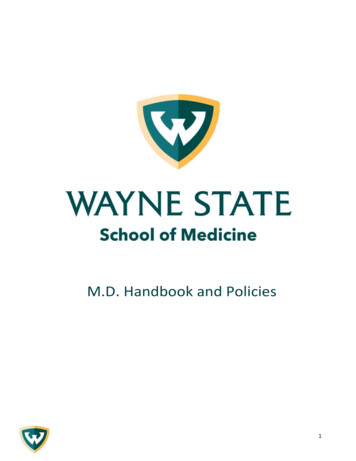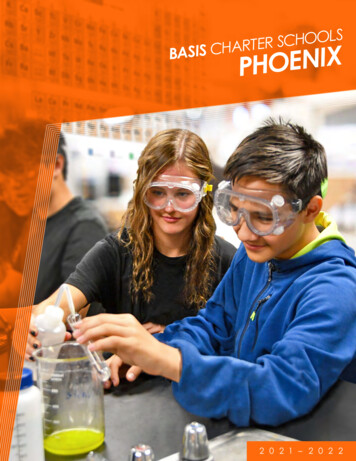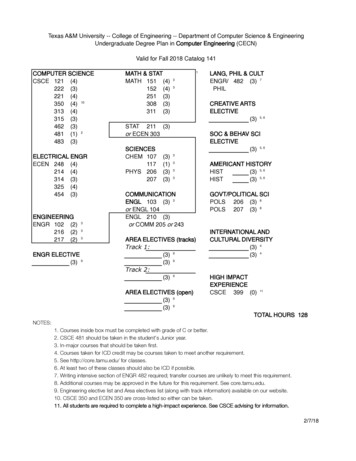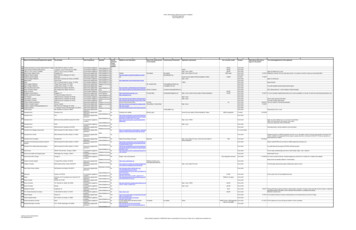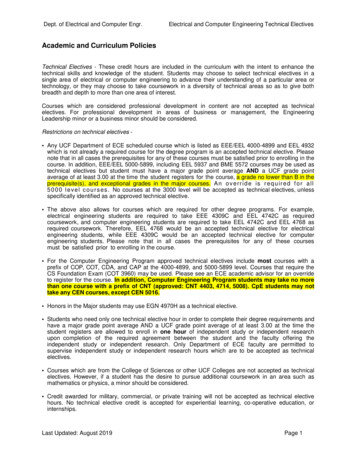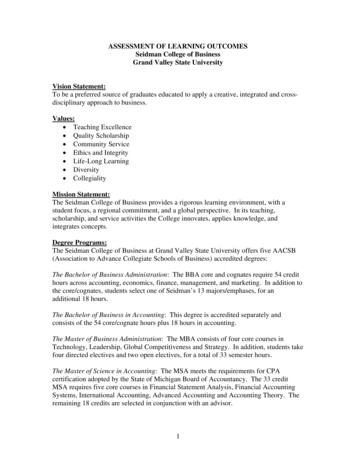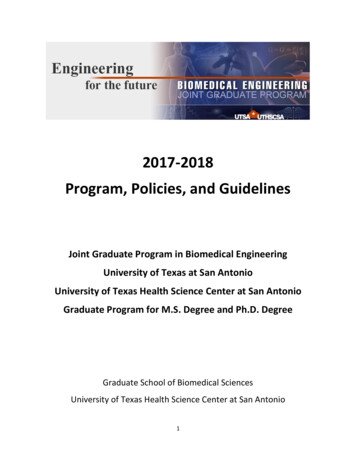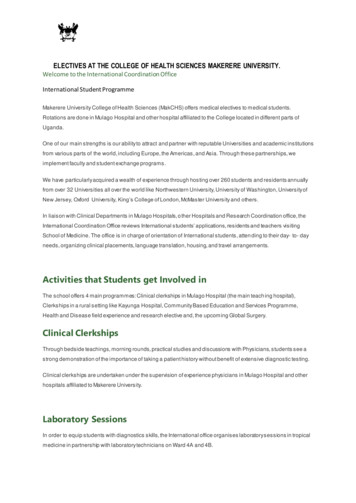
Transcription
ELECTIVES AT THE COLLEGE OF HEALTH SCIENCES MAKERERE UNIVERSITY.Welcome to the International Coordination OfficeInternational Student ProgrammeMakerere University College of Health Sciences (MakCHS) offers medical electives to medical students.Rotations are done in Mulago Hospital and other hospital affiliated to the College located in different parts ofUganda.One of our main strengths is our ability to attract and partner with reputable Universities and academic institutionsfrom various parts of the world, including Europe, the Americas, and Asia. Through these partnerships, weimplement faculty and student exchange programs.We have particularly acquired a wealth of experience through hosting over 260 students and residents annuallyfrom over 32 Universities all over the world like Northwestern University, University of Washington, University ofNew Jersey, Oxford University, King’s College of London, McMaster University and others.In liaison with Clinical Departments in Mulago Hospitals, o ther Hospitals and Research Coordination office, theInternational Coordination Office reviews International students’ applications, residents and teachers visitingSchool of Medicine. The office is in charge of orientation of International students, atten ding to their day- to- dayneeds, organizing clinical placements, language translation, housing, and travel arrangements.Activities that Students get Involved inThe school offers 4 main programmes: Clinical clerkships in Mulago Hospital (the main teach ing hospital),Clerkships in a rural setting like Kayunga Hospital, Community Based Education and Services Programme,Health and Disease field experience and research elective and, the upcoming Global Surgery.Clinical ClerkshipsThrough bedside teachings, morning rounds, practical studies and discussions with Physicians, students see astrong demonstration of the importance of taking a patient history without benefit of extensive diagnostic testing.Clinical clerkships are undertaken under the supervision of experience physicians in Mulago Hospital and otherhospitals affiliated to Makerere University.Laboratory SessionsIn order to equip students with diagnostics skills, the International office organises laboratory sessions in tropicalmedicine in partnership with laboratory technicians on Ward 4A and 4B.1
ELECTIVES AT THE COLLEGE OF HEALTH SCIENCES MAKERERE UNIVERSITY.Students are taught how to diagnose tropical diseases like malaria. Through this student and resident acquire thebasic techniques required to stain and culture bacteria as well as those techniques required to study themetabolism, growth and environment influences on bacteria.Community Based Education and Services (COBES)Community Based Education and Services (COBES) is an off-campus service learning which combineseducational and service objectives and provides real life experiences for students.Students are posted for community internships along Makerere University students in various hospitals and healthcentres ranging from District (General) hospitals, missionary hospitals, private hospital s, health centre III, healthcentre IV and private medical centres through out the country. Students participate in facility and communityactivities as guided by the medical officer at the health centre.At COBES sites, students are received by health workers called site tutors who are trained by the Faculty to carryout various roles of coordinating, guiding, supervising and facilitating the learning process. Site Tutors range frommedical doctors, clinical offers, Nurses, Dentists, Pharmacists and Family Physicians.Outreach Programs In partnership with Alive Medical Centre located in Namuwongo, a low -cost residential area in KampalaCity, several students get an opportunity to go for an outreach programme in Namuwongo slums givingout food to people infected and affected by HIV/AIDS. Namuwongo is one of the slums in Kampalagreatly affected by HIV/AIDS. In Uganda’s capital of Kampala, Alive Medical Centre serves the city’s poorest and most denselypopulated areas. The clinic provides free HIV treatment services to approximately 2,000 patients, whileover 5,500 await treatment. The organization estimates that 70% of people they reach have beeninternally displaced from the conflict in Northern Uganda. Additional outreach services include healtheducation and supplies distribution (e.g., condoms, bleach kits to clean syringes, clothes andoccasionally food). Through outreach programmes, students appreciate the importance of healtheducation and medical care to smaller communities which have limited access to medical services.Research ElectivesSeveral students undertake research projects in fulfillment of their elective as a requisite of the internationalhealth experience. At Makerere University College of Health Sciences, students are encouraged to unde rtakeresearch because it is at the forefront of medicine. In doing so, the overall quality of health care and biomedicalscience for Uganda will be improved.2
ELECTIVES AT THE COLLEGE OF HEALTH SCIENCES MAKERERE UNIVERSITY.Social ClassesIn order to appreciate social and economic determinants of health, and the globa l burden of disease, the ICOorganizes classes on cultural and social issues in Uganda, language classes and social activities like traditionalengagement parties, cultural dances and visits to cultural sites.This enhances the students’ knowledge of the diverse Ugandan cultures, different health belief models andcustoms, how they impact on different aspects of health care and hence acquire adequate skills to communicateacross cultural boundaries appropriate for effective global health care providers.Volunteer opportunitiesThe International Coordination Office works closely with orphanages in Kampala where students get opportunityto work and play with the children. The students in partnership with these orphanages are also able to sensitizestreet children about the dangers of unprotected sex, drugs, etcHealth and Disease Field CourseMakerere University College of Health Sciences in partnership with University of Wisconsin conducts the annualHealth and Disease field course, which takes place May 15th to June 8th. Through lectures from differentspecialists, students are introduced to health and disease in Uganda.The International Coordination Office organises tours to several units like Mwanamugimu Nutritional Unit, TASOMulago and Kamwokya Catholic Community Limited (KCCL) where students spend time learning about thevarious issues that affect health care in Uganda.Partnerships with Other UniversitiesEuropeKarolinska InstitutetStudent exchange in Medicine, Nursing, midwifery and PhysiotherapyTeacher exchange programme in Medicine, Nursing, midwifery andPhysiotherapyShort course in Global Surgery. (Commencing in 2011).PhD programme.Dentistry& Speech and Language Therapy to start soon.Course in Global surgery to start soon3
ELECTIVES AT THE COLLEGE OF HEALTH SCIENCES MAKERERE UNIVERSITY.Maastricht University, The NetherlandsPartnership in training Medical students from Maastricht at Makerere.University of Bergen.Partnership in training medical students from Bergen twice a year.Ghent University, BelgiumPartnership of medical students from Ghent University.Kristianstad UniversityStudent exchange in Nursing Department to start in August.Staff exchangeUniversity of Brescia, ItalyTeacher exchangeAlbert-Ludwig-University FreiburgStaff exchange in Psychiatry Department.JapanFUKUI Medical University, JapanTeacher/ student exchange from Department of Orthopeadics.CanadaUniversity of British ColumbiaHPV research.Surgery training.McMaster UniversityResidents’ exchange program for residents for Anaesthesia, InternalMedicine, Paediatrics and Ob stetrics and Gyneacology.Medical student training.Specialized training for Physicians at McMaster University.United States of AmericaCase Western Reserve University, School ofPartnership in training Makerere University staff in Bioethics.Medicine.Wisconsin UniversityHealth and Disease field course.Medical electives.Yale Medical SchoolTeacher exchange.Medical students’ exchange.4
ELECTIVES AT THE COLLEGE OF HEALTH SCIENCES MAKERERE UNIVERSITY.Resident exchange programme.Des Moines University, Iowa U.S.AMedical Student exchangeUniversity of California San FranciscoTraining residents at Makerere (Medicine).Collaborative research in MalariaTrauma management among police. (Surgery).University of MinnesotaMedical student exchange programmeCollab orative researchTeacher exchange programme in Peadiatrics DepartmentNorthwestern UniversityPartnership in training Medical students in COBES and International Health.Columbia UniversityTeacher/student exchange in Paediatrics Department.IsrealBen- Gurion University, IsrealPartnership in training Medical students from Ben-Gurion at MakerereUniversity.Why study at Makerere UniversityThe biggest University in East Africa with a mission to provide innovative teaching, learning, research andservices responsive to National and Global needs, Makerere University offers a broad range of academic actvitiesin a resource constrained enviroment. The University has 35,000 undergraduate students and 3,500 graduatestudents.Formed in 2008, College of Health Sciences offers the best international programs through Mulago Hospital; themain teaching hospital and other hospitals affiliated to the college. Through these programs; International students and Makerere students are trained to adopt easily in future, to emerging h ealthchallenges of human resource-poor countries. This is so because students and Faculty get opportunitiesto gain real world experience in international medicine. Due to many innovations at the College of Health Sciences, research opportunities and cli nicalclerkships available in the hospital, Students, residents and Faculty get life changing exposure and a5
ELECTIVES AT THE COLLEGE OF HEALTH SCIENCES MAKERERE UNIVERSITY.breadth of cultural, social, political, and clinical experiences that are not available within their owncountries. The friendliness of staff and students at the College of Health Sciences fosters a conducive environmentfor student to learn. Students and Residents get hands -on experience in doing field studies and problems one mayencounter in sampling, compliance, translation of interview questionnaires and use of interpreters anddoing qualitative research. Life at Mulago Hospital A typical day on the wards. . .8:00am – Lectures, frequently peer teaching from house staff with an attending overseeing the lecture.9:00am – Ward rounds with house staff, medical students and attending physician, rounds typically lastuntil 12-1pm.1:00pm – Lunch. House staff frequently takes lunch at 1pm, with teaching rounds by attending in theafternoon or clinic depending on what rotation the student is on . The schedule varies from day to day depending on the individual team, the visiting lecturers and the dayof the week. Out -patient Clinics Clinics are located in the Clinic Building at the South end of the hospital on the 4th floor. Clinics arepacked with patients who are seen by house staff and students, who then present to the attending orsenior house staff. You are highly encouraged to attend clinics. Clinic start times vary. Find out fromthe clerk at check-in for accurate information. In general, clinics start when the first resident/attendingarrives, and end when the last patient is seen.Life in KampalaKampala is very friendly indeed and, unlike many thriving, modern cosmopolitan cities - and Kampala is all that,you are never far from a warm smile or relaxed greeting, and your wish to walk the streets is not daunted by anyworries of intimidation or street violenceCinemas, Casinos, nightclubs and musical events are options that can be explored depending on an individual’sinterests. Som e popular pubs include: Just Kicking Sports Bar at Kisementi in Kamwokya, Fat Boys – Kisementi, Kamwokya Rhino Pub, Sheraton Hotel O’Leary ‘s, Kololo Rock Garden Café - Speke Hotel6
ELECTIVES AT THE COLLEGE OF HEALTH SCIENCES MAKERERE UNIVERSITY. Blue Bar, Crested Towers Club Rouge, Kampala Rd BJ’s Irish Bar & Restaurant, 2nd Street Industrial AreaReligionThere are three main religious hills - Lubaga Hill where the Headquarters of the Catholic faith is; Namirembe Hillwhich provides the Headquarters of the British Church Missionary Society/Anglican Church, while Kib uli HillHeadquarters the main Muslim Mosque.Set Up of KampalaNakasero Hill and Kololo Hill provide administrative offices, diplomatic residential areas and residential areas foraffluent locals, and Makerere Hill is home to the Makerere University main campus. Mengo Hill, where theBuganda King's Palace was situated, provided a reception point for foreign missionaries arriving in Uganda.Kampala Hill (Hill of the antelopes - Ka Impala), after which the city was named provided the fort.UgandaUganda, "the Pearl of Africa," is a small landlocked East African country on the shores of Lake Victoria, thesource of the Nile.Uganda: the Country and its PeopleUganda lies between the two arms of the Great Rift Valley in East Africa and is crossed by the equato r. It borderswith Kenya to the East, Sudan to the North, DRC to the West and Tanzania and Rwanda to the south. Ugandalies on the Great African Plateau with an average altitude of 4000 ft (1200M) above the sea level. Elevated areasare the Rwenzori Mountains (5000m) with permanent snow cover and Mount Elgon (4300m). AreaTotal area is 242,139sq km, of which 42,000sq km (17%) is swamps and open fresh water bodies and 30, 000 sqkm (12%) is forest reserves and game parks. ClimateUganda’s climate is equatorial but it is tempered by its elevated altitude. The average annual temperature isbetween 20 and 26 degrees centigrade over much of the country although 5 degrees centigrade in South Westernand 35 degrees centigrade in the North and North East can be recorded.Average annual rainfall is 1000mm in most parts of the country with the rainy seasons taking place in April/Mayand October/November. The wettest season takes place between March/April and hottest months in the year are7
ELECTIVES AT THE COLLEGE OF HEALTH SCIENCES MAKERERE UNIVERSITY.from December to February when the temperatures reach 29 degrees centigrade. Most of Uganda is green allyear round. A few facts on Health and DevelopmentLife expectancy in Uganda is 51 years for men and 53 years for women. This is a decrease from previous lifeexpectancy, and is largely due to the HIV/AIDS epidemic in the country. The fertility rate in Uganda is one of thehighest in the world: 6.8 children per woman, leading to a population growth of 3.6% per year. This also meansthat there are a lot of children: 50% of the population in Uganda is under 15 years of age. Infant mortality is 66deaths per 1,000 live births.Although it is technically free to see a government doctor in Uganda, fees for pharmaceuticals and diagnostictests are common. As a result, poorer people often wait until their diseases are advanced to seek medicalattention. Some of the common illnesses in Uganda are HIV/AIDS and its opportunistic infections, TB andmalaria, as well as a plethora of other infectious diseases uncommon in developed countries. One of the majorchallenges Uganda is facing is a severe shortage of physicians, especially in rural areas. Many physicians whotrain in Uganda leave to practice medicine elsewhere, enticed by much higher wages and easier lifestyles. Education in UgandaUganda's literacy rate in 2002 was 77% for men and 58% for women. Primary education is free but of variablequality. Free Secondary education is currently implemented in a few secondary schools. In 2000, 49% ofUgandan boys had completed primary education, and 25% of girls, but only 13% of boys and 7% of girls hadcompleted secondary education. This disparity between men and women continues to the university level.Approximately 30% of the current medical students at Makerere University are female, though the n umber offemale physicians is increasing. University fees are out of reach of most people although there is governmentsponsorship available for those who score very highly in exams.LanguagesUganda’s official language is English, although Swahili is also being debated as a potential nationallanguage. Most educated Ugandans can speak some form of English. Luganda is the language which is mostwidely spoken in Uganda, but mostly in Central, Near Eastern and South Western Uganda. It is the mother tongueof the Buganda people of the Central region and are very predominant around Kampala. English is left over fromLuo and other languages are used in the North and there are dozens of other tribal languages throughout thecountry.8
ELECTIVES AT THE COLLEGE OF HEALTH SCIENCES MAKERERE UNIVERSITY.Money and BankingThe currency used is the Uganda Shilling. There are quite a number of international banks that you could use formoney transactions: Barclays Bank, Standard Chartered Bank, and Stanbic Bank.Several ATM machines accept major debit cards. These include ATM Mach ines for the Standard Chartered Bank,Orient Bank, Crane Bank, Stanbic Bank and Barclays Bank; they all accept Visa and Visa Electron Cards. Creditcards are largely not used in Uganda –Visa and American Express are accepted only in big upmarket hotels(usually with a relatively high transaction fee). Please inform your bank that you are travelling to Uganda, so thatyou do not get problems when withdrawing money with use of ATM while in Uganda.Money can be obtained through a VISA advance at Barclays bank with a 10% charge. Foreign Exchange Bureausare readily accessible and offer competitive exchange rates. Most of them are open until 5.00pm, includingSaturdays but the Crane Forex Bureau at Speke Hotel is open until 8.30pm every day.Please bring USD, GBP, Euros and other major currencies in big denominations, 100 and 50 bills arepreferable. Bills smaller than 50 are bought by the Forex Bureau at a lower exchange rate; 20% less than whatyou would get for 50 and 100 bills.). Cashing traveller’s chequ es is charged a minimum of 10% service.The preferred means of payment is cash for most transactions in Uganda.What to wearA modest dress code should be followed at all times. An umbrella, raincoat, sturdy shoes and jacket arerecommended for the wet season.In general, dress modestly and conservatively, as you would in the clinic or the hospital setting in your homecountry. Do not wear jeans, shorts, sneakers, sports t-shirts, or overly tight or revealing clothing in thehospital. Bring eye protection, especially if you are on OB/GYN or surgery, even if you already wear glasses.For women*Skirts with lengths to or below the knee, or dress trousers (cotton or linen or synthetic blends are ok), with ablouse, shirt, or sweater.*Nice shoes (many students wear ballet-flat style) or sandals. At least one pair of closed-toe shoes isrecommended. You may also consider wearing Dansko's or other clogs, especially if you will be walking a lot orstanding in the operating theater. If you are on OB/Gyn, bring a pair of Crocs or Dansko's and foot covers.*Scrubs (if on surgery or OB/GYN)-check with the international office about what to wear when you are introducedto your team. However you may want to bring scrubs with you on the first day.9
ELECTIVES AT THE COLLEGE OF HEALTH SCIENCES MAKERERE UNIVERSITY.For men*Trousers (including nice comfortable khakis), with an ironed shirt (with or without tie)*Comfortable Shoes Other suggestions*Iron your clothes and white coats, and polish your shoes if you are able to, as this is a sign of respect to bothyour patients and colleagues in the hospital.*Many of you will be walking to the hospital and your shoes might get quite dusty or muddy. Consider wearing apair of walking shoes to work and keeping a pair of shoes to wear in the hospital in your bag or in the InternationalCoordination Office with Susan. Or, you could keep a cloth to wipe your shoes in the office. You may alsoconsider bringing a shoe shiner (i.e. the Kiwi brand express shoe shine sponge), which is everywhere in the US,but impossible to find in Uganda.Health and SafetyTravel precautions and tips: Scams: Thefts are the major “scams” you will encounter, including pick-pockets in crowds, such as atsoccer matches, and thefts from parked vehicles or vehicles stuck in traffic. Also, take care when doingany online banking or purchases in Uganda, as there has been an increase in fraud involving wiretransfers, credit cards, checks etc. You may consider arranging for travel insurance that has theft insurance for electronics or othervaluables. A money belt is especially nice when traveling long distances. Be careful around blood draws (high HIV infection risk) Avoid running through grass trails as there are lots of cobras and mambas in rural Uganda. Stick to themain roads unless you are walking slowly and making a lot of noise. Avoid walking alone at night, especially in isolated, dark places. Be respectful around armed guards and military personnel. In small towns, avoid traveling with large denomination bills– it may be much easier for the seller ofsome item/shopkeeper to raise the price of whatever item you are purchasing than to find your change. Keep away from scenes of violence and violent protests Try as much as possible to keep away from crowded places that may be a target for terror attacks.Likewise, report any suspicious packages and parcels in your vicinity.Local resources Robbery, crime: contact site coordinator, local police.10
ELECTIVES AT THE COLLEGE OF HEALTH SCIENCES MAKERERE UNIVERSITY. Stolen passport: contact Embassy of your country. Civil unrest: check with your embassy to see what arrangement they have in place for your protectionand safety.Transportation Avoid using Boda Boda cycles (motorcycle taxis); they are a leading cause of accidents, injuries anddeaths. When using public transport from a Bus or Taxi Park, do not let the “baggage h andlers” touch yoursuitcase; you may have to tip them generously to rescue your baggage.How to get from the airport to your sitePlease make sure Susan Nassaka (International Office Coordinator at Makerere University College of HealthSciences) knows when you are coming and confirm a few days beforehand, so that she can have a driver waitingfor you at the airport. Feel free to tip the driver 7- 10.Typical costs of basic items Food budget: 50,000-70,000 UgSh/week (up to 100,000 depending on how much you eat out) 1L water 1,000 UgS. Transport: 20,000- 50,000Ug Shillings per week depending on how much you use taxis. Accommodation: 25,000- 50,000 Ug. Shillings per night.Items which you may wish to bring Gloves - variably available on the wards Respirator masks - Hand sanitizer – wash basins are not readily available in the hospital and wherepresent there is frequently no soap or towel. Antiretroviral medications for post-exposure prophylaxis, BP machine, stethoscope, ophthalmoscope,and patella hammer. Donations (Please carry as much as you can for donation). Nasal Prongs (for adults) Oxygen masks (for adults - non-breathing ) Pulse Oxi metres Asthma and COPD medicines ( inhalers) Portable blood pressure machines. Digital thermometres. Spacers Peakflow metres Masks- N9511
ELECTIVES AT THE COLLEGE OF HEALTH SCIENCES MAKERERE UNIVERSITY. Blood pressure cuff links. Gloves.One can also choose to visit one of the many game parks in the country or spend a leisurely afternoon watchingcultural dancers at Ndere Troupe Center in Ntinda, near the City Centre.Application processIn case you are interest in undertaking medical electives:Step I: Download the application form from the website or write to the International Coordinator to send you anapplication form.Step: II: Send the filled-in application form and all required documents to the Coordinator.Step III: The Coordinator will send you an acceptance letterStep: IV: Send flight details to the CoordinatorFor details contact : internationaloffice@chs.mak.ac.ug12
ELECTIVES AT THE COLLEGE OF HEALTH SCIENCES MAKERERE UNIVERSITY.STUDENT APPLICATION FORM.Application InstructionsOn the enclosed application, fill out the duration of your stay and the departments you wish torotate through in those weeks. It is possible to do a different service each week to gain a survey viewof Mulago, or to do the whole month on one service if you wish a more focused experience. There isalso a rural rotation available if you wish to see Ugandan medicine practiced outside Kampala as well.Please complete the attached application with the schedule you desire, and we look forward toseeing you here at Makerere University!Completed Makerere University application form will consist of.1. Letter of recommendation signed by the Dean/elective coordinator from the sending University.2. Personal health insurance coverage during their study period at Medical School MakerereUniversity and be able to show the evidence on request.3. Hepatitis B immunization and Malaria Prophylaxis highly desirable.4. Brief background statements that we can use to introduce you to your instructors.5. Clear goals for this experience. (Why do you want to study Medicine in Uganda.)6. Your recent photograph.7. Remit Administrative fees on Makerere College of Health Sciences account if possible.For further information on fees, curriculum, courses etc. please write to the Deputy Principal Collegeof Health Sciences at deputyprincipal@chs.mak.ac.ugContact Person: Coordinator International Programs, College of Health Sciences MakerereUniversity Nassaka Susan . Telephone 256-414-542999Email sbyekwaso@yahoo.com/snassaka@chs.mak.ac.ug or/and internationaloffice@chs.mak.ac.ugNote Please scan the filled application and supporting documents and send them byemail.13
ELECTIVES AT THE COLLEGE OF HEALTH SCIENCES MAKERERE UNIVERSITY.ACADEMIC YEAR .PhotoFIELD OF STUDY: MedicineSENDING INSTITUTIONHome Institution: Elective coordinator (contact person) in home institution.Name E-mail Telephone Fax : Emergency contact in home country.STUDENT’S PERSONAL DATAFamily name: First name (s): .Date of birth: .Sex: .Place of Birth: .Nationality: Current address: .Permanent address (if different): .Current address is valid until: .Tel.: .E-mail: HEALTH INSURANCEInsurance companyInsurance number and validity14
ELECTIVES AT THE COLLEGE OF HEALTH SCIENCES MAKERERE UNIVERSITY.PROPOSED FIELD OF STUDY PROGRAM AT THE COLLEGE OF HEALTH SCIENCESWrite according to the order of choice- Please fill this part.ProgramInternal MedicinePaediatricsObstetrics &Gynaecology.SurgeryPharmacyClinical Rotation Psychiatry . Research Project Rural rotation . FamilyMedicineCourse title/Subject (see next page for choices available)Rotations must begin on Monday.Please specify dates and order of priority.ADDITIONAL INFORMATION Student’s signatureDate and PlaceSending institutionWe confirm that the proposed program of study is approved . .Elective coordinatorDate and Place.15
ELECTIVES AT THE COLLEGE OF HEALTH SCIENCES MAKERERE UNIVERSITY.Clinical rotations.The suggested minimum duration of clinical rotations is 2 weeks. The application has to go through theinternational liaison office in the Dean’s offices. The departments will determine whether they accept astudent or not. Please mention on the application form a 2nd and 3rd choice in case 1st choice cannot be metbecause of capacity problems. (Please choose from these units)Possible available rotations.1. INTERNAL MEDICINEo Cardiology.o Infecticious Diseaseso Gastroenterology.o Endocrinologyo dermatology nephrologyo Endocrinologyo Rheumatologyo Haematology/ oncologyo Neurologyo Emergency Medicine (Casualty)2. PAEDIATRICS.o Acute care unit (Emergency ward)o Special care unit ( Neo-nates)o Nutritional Unit (Mwanamugimu).o Sickle cell clinico General Paediatric3. logyCard thoraxDentistryPaediatricsOrthopaedicsGeneral SurgeryPlastic surgery16
ELECTIVES AT THE COLLEGE OF HEALTH SCIENCES MAKERERE UNIVERSITY.3. OBSTETRICS AND GYNAECOLOGY.o Obstetricso Gyneacology.4. PSYCHIATRY.o Mulago Hospitalo Butabika Hospital5. Anaesthesiao Perioperative careo Chronic Paino Intensive care medicineo Research in obstetrics Dr.Arthur–Kwizera6. Dentistry7. Pharmacy8. Radiologyo Ultra Sound.o Plain Radiologyo Interventional Radiologyo Radiotherapyo Clinical imaging based on systems e.g. Respiratory, Gastroenterologyo Breast imaging.9. Community Based Education and Services (COBES).Community Based Education and Services (COBES) is an off campus service learning which combineseducational and service objectives and provides real life experiences for students. Students are posted forcommunity internships in various hospitals and health centres ranging from District (General) hospitals,missionary hospitals, private hospitals, health centre III, health centre IV and private medical centresthrough out the country. Students participate in facility and community activities as guided by the medicalofficer at the health centre.17
ELECTIVES AT THE COLLEGE OF HEALTH SCIENCES MAKERERE UNIVERSITY.Appendix IGuidelines for Research Proposals for approval of re search to be carried at the College of HealthSciences Makerere UniversityThe following guidelines and standards are required of all research proposals to be forwarded to theSchool of Medicine College of Health Sc
ELECTIVES AT THE COLLEGE OF HEALTH SCIENCES MAKERERE UNIVERSITY. 5 Resident exchange programme. Des Moines University, Iowa U.S.A Medical Student exchange University of California San Francisco Training residents at Makerere (Medicine). Collaborative research in Malaria Trauma management among police. (Surgery).



